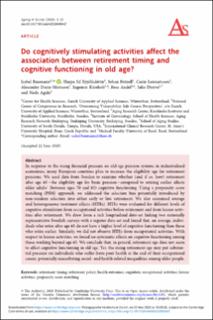Please use this identifier to cite or link to this item:
https://doi.org/10.21256/zhaw-20782| Publication type: | Article in scientific journal |
| Type of review: | Peer review (publication) |
| Title: | Do cognitively stimulating activities affect the association between retirement timing and cognitive functioning in old age? |
| Authors: | Baumann, Isabel Eyjólfsdóttir, Harpa Sif Fritzell, Johan Lennartsson, Carin Darin-Mattsson, Alexander Kåreholt, Ingemar Andel, Ross Dratva, Julia Agahi, Neda |
| et. al: | No |
| DOI: | 10.1017/S0144686X20000847 10.21256/zhaw-20782 |
| Published in: | Ageing & Society |
| Volume(Issue): | 42 |
| Issue: | 2 |
| Page(s): | 306 |
| Pages to: | 330 |
| Issue Date: | 2022 |
| Publisher / Ed. Institution: | Cambridge University Press |
| ISSN: | 0144-686X 1469-1779 |
| Language: | English |
| Subjects: | Retirement timing; Retirement policy; Health outcome; Cognition; Occupational activity; Leisure activity; Propensity score matching |
| Subject (DDC): | 305: Groups (age, origine, gender, income) 613: Personal health |
| Abstract: | In response to the rising financial pressure on old-age pension systems in industrialised economies, many European countries plan to increase the eligibility age for retirement pensions. We used data from Sweden to examine whether (and if so, how) retirement after age 65 – the eligibility age for basic pension – compared to retiring earlier affects older adults’ (between ages 70 and 85) cognitive functioning. Using a propensity score matching (PSM) approach, we addressed the selection bias potentially introduced by non-random selection into either early or late retirement. We also examined average and heterogeneous treatment effects (HTEs). HTEs were evaluated for different levels of cognitive stimulation from occupational activities before retirement and from leisure activities after retirement. We drew from a rich longitudinal data-set linking two nationally representative Swedish surveys with a register data-set and found that, on average, individuals who retire after age 65 do not have a higher level of cognitive functioning than those who retire earlier. Similarly, we did not observe HTEs from occupational activities. With respect to leisure activities, we found no systematic effects on cognitive functioning among those working beyond age 65. We conclude that, in general, retirement age does not seem to affect cognitive functioning in old age. Yet, the rising retirement age may put substantial pressure on individuals who suffer from poor health at the end of their occupational career, potentially exacerbating social- and health-related inequalities among older people. |
| URI: | https://digitalcollection.zhaw.ch/handle/11475/20782 |
| Fulltext version: | Published version |
| License (according to publishing contract): | CC BY 4.0: Attribution 4.0 International |
| Departement: | School of Health Sciences |
| Organisational Unit: | Institute of Public Health (IPH) |
| Published as part of the ZHAW project: | Die gesundheitlichen Auswirkungen einer späteren Pensionierung |
| Appears in collections: | Publikationen Gesundheit |
Files in This Item:
| File | Description | Size | Format | |
|---|---|---|---|---|
| 2020_Baumann-etal_Cognitively-stimulating-activities-retirement-timing-cognitive-functioning.pdf | 676.86 kB | Adobe PDF |  View/Open |
Show full item record
Baumann, I., Eyjólfsdóttir, H. S., Fritzell, J., Lennartsson, C., Darin-Mattsson, A., Kåreholt, I., Andel, R., Dratva, J., & Agahi, N. (2022). Do cognitively stimulating activities affect the association between retirement timing and cognitive functioning in old age? Ageing & Society, 42(2), 306–330. https://doi.org/10.1017/S0144686X20000847
Baumann, I. et al. (2022) ‘Do cognitively stimulating activities affect the association between retirement timing and cognitive functioning in old age?’, Ageing & Society, 42(2), pp. 306–330. Available at: https://doi.org/10.1017/S0144686X20000847.
I. Baumann et al., “Do cognitively stimulating activities affect the association between retirement timing and cognitive functioning in old age?,” Ageing & Society, vol. 42, no. 2, pp. 306–330, 2022, doi: 10.1017/S0144686X20000847.
BAUMANN, Isabel, Harpa Sif EYJÓLFSDÓTTIR, Johan FRITZELL, Carin LENNARTSSON, Alexander DARIN-MATTSSON, Ingemar KÅREHOLT, Ross ANDEL, Julia DRATVA und Neda AGAHI, 2022. Do cognitively stimulating activities affect the association between retirement timing and cognitive functioning in old age? Ageing & Society. 2022. Bd. 42, Nr. 2, S. 306–330. DOI 10.1017/S0144686X20000847
Baumann, Isabel, Harpa Sif Eyjólfsdóttir, Johan Fritzell, Carin Lennartsson, Alexander Darin-Mattsson, Ingemar Kåreholt, Ross Andel, Julia Dratva, and Neda Agahi. 2022. “Do Cognitively Stimulating Activities Affect the Association between Retirement Timing and Cognitive Functioning in Old Age?” Ageing & Society 42 (2): 306–30. https://doi.org/10.1017/S0144686X20000847.
Baumann, Isabel, et al. “Do Cognitively Stimulating Activities Affect the Association between Retirement Timing and Cognitive Functioning in Old Age?” Ageing & Society, vol. 42, no. 2, 2022, pp. 306–30, https://doi.org/10.1017/S0144686X20000847.
Items in DSpace are protected by copyright, with all rights reserved, unless otherwise indicated.